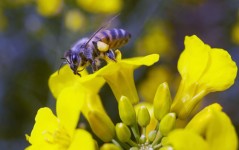Bayer, Syngenta Respond to Europe’s Deadlock on Neoniconitoid Ban

The European Commission’s vote on implementing an EU-wide ban on neoniconitoids ended in a deadlock on Friday, with a majority of member states refusing to support the proposal that would restrict the pestcides’ use on all crops attractive to bees.
The Commission must now decide whether to appeal the decision or amend the proposal for a two-year ban.
Syngenta Chief Operating Officer, John Atkin, said: “We are pleased that EU Member States did not support the European Commission’s shamefully political proposal. Restricting the use of this vital crop protection technology will do nothing to help improve bee health.”
Syngenta – which makes the thiamethoxam seed treatment, one of the three pesticides targeted by the EU – said it has repeatedly pointed out that the European Commission tried to justify its actions on the basis of a “hurried and highly theoretical review” by the European Food Safety Agency (EFSA), Europe’s food safety watchdog.
EFSA’s review, Syngenta said, “made fundamental mistakes which led to a serious over-estimation of the amount of pesticide bees are exposed to under field conditions. It also ignored key studies and independent monitoring by governments which prove the safety of neonicotinoid pesticides.” EFSA, Syngenta said, based its assessment on unrealistic and excessive seed planting rates between two and four times higher than would be used under modern agricultural practice.
Neoniconitoids have been implicated in colony collapse disorder, a phenomenon in which worker bees from a beehive or European honeybee colony abruptly disappear. However, scientific data – including the European Commission’s – show that pesticides play a negligible role compared to diseases, viruses and loss of habitat. As an example, a USDA report from 2010 cited a combination of environmental stressors, which may set off a cascade of events and contribute to a colony where weakened worker bees are more susceptible to pests and pathogens.
Germany-based Bayer CropScience, which makes clothianidin and imidacloprid, also welcomed the Commission’s lack of consensus. “This provides hope to European farmers, that they can continue to have access to safe and effective crop protection products supporting their ability to grow safe, high-quality, affordable food. The failure to reach a conclusive decision is a clear recognition that there is no convincing argument against the continuing use of neonicotinoid-based products,” the company said.
Bayer faults the Commission for being overly precautionary. It added: “There has been a long history of the safe use of neonicotinoid insecticides and it is clear that when they are used responsibly and properly, any impact on bees is negligible.”






